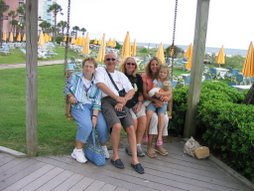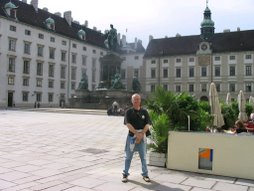Saturday, November 22, 2008
Happy Thanksgiving
Just wanted to make a few comments about having watched the global financial / economic crisis unfold. The first thing is about the Bush bail out. In his administration’s typical fashion, meaning that everything they’ve touched has turned to shit and criminal, the entire bail out is a joke and it’s not working. This has undoubtedly been the most inept presidential administration I have witnessed in my lifetime. They can’t accomplish anything worthwhile. Can we make it until 20 January?
It’s all so obvious that those in charge just don’t get it. The government used the people’s money to bail AIG out and AIG used some of the money for luxury trips for their staff. The three CEOs of the Big Three automakers flew to beg money from the government in three separate private jets. Then you see the typical Republican talking points about labor costs and labor unions being one of the root causes of the automakers troubles. These are people of the lowest order. The scum of the worst of American politics.
Should the government help save the automakers or not? I honestly don’t know.
Read these for more.
The Simple Arithmetic of Hank Paulson’s Financial Disaster by David Fiderer
http://www.huffingtonpost.com/david-fiderer/the-simple-arithmetic-of_b_145389.html
You Got Screwed, CEOs Made A Fortune by Jonathan Tasini
http://www.huffingtonpost.com/jonathan-tasini/you-got-screwed-ceos-made_b_145125.html
We’ve Been Down This Road Before: A Great Depression Quiz by Jacob Savage
http://www.huffingtonpost.com/jacob-savage/weve-been-down-this-road_b_145542.html
Bailout or Bust: How to Save the Big Three From Themselves by Titus Levi
http://www.truthdig.com/report/item/20081120_how_to_save_the_big_three_from_themselves/
Below is the full text of an article about my hometown. Huntington, WV was named the unhealthiest city in the US. Thanks to David Lebo for sending me the link.
http://www.msnbc.msn.com/id/27697364/
W. Virginia town shrugs at being fattest city
Huntington characterized as obese, toothless and poor in recent report
The Associated Press
updated 7:02 p.m. ET Nov. 17, 2008
HUNTINGTON, W.Va. - As a portly woman plodded ahead of him on the sidewalk, the obese mayor of America's fattest and unhealthiest city explained why health is not a big local issue.
"It doesn't come up," said David Felinton, 5-foot-9 and 233 pounds, as he walked toward City Hall one recent morning. "We've got a lot of economic challenges here in Huntington. That's usually the focus."
Huntington's economy has withered, its poverty rate is worse than the national average, and vagrants haunt a downtown riverfront park. But this city's financial woes are not nearly as bad as its health.
Nearly half the adults in Huntington's five-county metropolitan area are obese — an astounding percentage, far bigger than the national average in a country with a well-known weight problem.
Huntington leads in a half-dozen other illness measures, too, including heart disease and diabetes. It's even tops in the percentage of elderly people who have lost all their teeth (half of them have).
It's a sad situation, and a potential harbinger of what will happen to other U.S. communities, said Ken Thorpe, an Emory University health policy professor who is working with West Virginia officials on health reform legislation.
"They may be at the very top, but obesity and diabetes trends are very similar" in many other communities, particularly in the South, Thorpe said.
Huntington's health problems, cited in a U.S. health report, are a terrible distinction for the city, but the locals barely talk about it. Many don't even know how poorly the city ranks.
Culture and history are at least part of the problem, health officials say.
This city on the Ohio River is surrounded by Appalachia's thinly populated hills. It has long been a blue-collar, white-skinned community — overwhelmingly people of English, Irish and German ancestry.
For decades, Huntington thrived with the coal mines to its south, as barges, trucks and trains loaded with the black fuel continually chugged into and past the city. There were plenty of manufacturing jobs in the chemical industry and in glassworks, steel and locomotive parts. Nearly 90,000 people lived in the city in 1950.
The traditional diet was heavy with fried foods, salt, gravy, sauces, and fattier meats — dense with calories burnt off through manual labor. Obesity was not a worry then. Workplace injuries were.
Heart disease, little exercise
But as the coal industry modernized and the economy changed, manufacturing jobs left. The city's population is now fewer than 50,000, and chronic diseases — many of them connected to obesity — seem much more common.
Shari Wiley is a nurse at St. Mary's Regional Heart Institute in Huntington. She runs a program that identifies heavy school children and tries to teach them better eating and exercise habits. The effort began because of an alarming trend.
"A lot of the patients we were seeing were getting heart attacks in their 30s. They were requiring open heart surgery in their 30s. And we were concerned because it used to be you wouldn't see heart patients come in until they were in their 50s," Wiley said.
Huntington is essentially tied with a few other metropolitan areas for proportion of people who don't exercise (31 percent), have heart disease (22 percent) and diabetes (13 percent). The smoking rate is pretty high, too, although not the worst.
However, the Huntington area is a clear-cut leader in dental problems, with nearly half the people age 65 and older saying they have lost all their natural teeth. And no other city comes close to Huntington's adult obesity rate, according to the report by the U.S. Centers for Disease Control and Prevention, based on data from 2006.
Perhaps fittingly, hospitals are now Huntington's largest employers. Another is Marshall University, home of the "Thundering Herd" football team depicted in the 2006 film "We Are Marshall" which dominates local sports conversations.
People 'can't afford to get healthy'
The river runs along the edge of town, but it's not a focal point. Marshall and one of the city's remaining factories sit to the east with several blocks of hotels and office buildings farther west. A new complex called Pullman Square — which includes a movie theater and a Starbucks — is trying to become a retail and dining center and illustrates a transition to a service economy.
The area's unemployment rate was about 5 percent in September, actually a bit better than the 6.1 percent national average that month. But often the jobs are not high-paying. Many workers lack health insurance, and corporate wellness programs — common at large national companies — are rare.
Poverty hovers, with the area rate at 19 percent, much higher than the national average. In the hilly coal fields to the South, people still live in houses or trailers with drooping, battered roofs. They stare hard at any stranger in a new car. In Huntington and its outskirts, many people think of exercise and healthy eating as luxuries.
The economy needs to pick up "so people can afford to get healthy," said Ronnie Adkins, 67, a retired policeman, as he sat one recent morning on the smoking porch of the Jolly Pirate Donuts shop on U.S. 60.
Doughnut shops don't help either, of course. But breakfast pastry shops aren't the most common outlets for fatty food. Pizza joints are. They are seemingly on every block in some parts of the city. The Huntington phone book lists more pizza places (nearly 200) than the entire state of West Virginia has gyms and health clubs (149).
Hot dog places also abound, with the city hosting an annual hot dog festival every summer. "I've never seen so many places that are hot dog oriented. I guess it's a cultural thing. Appalachian," said Mayor Felinton, who grew up in Maryland and moved to Huntington to attend Marshall University and stayed put.
Fast food has become a staple, with many residents convinced they can't afford to buy healthier foods, said Keri Kennedy, manager of the state health department's Office of Healthy Lifestyles.
Kennedy said she had just seen a commercial that presented "The KFC $10 Challenge." The fried-chicken chain placed a family in a grocery store and challenged them to put together a dinner for $10 or less that was comparable to KFC's seven-piece, $9.99 value meal.
"This is what we're up against," said Kennedy, noting it's an extremely persuasive ad for a low-income family that is accustomed to fried foods. "I don't know what you do to counter that."
Lack of exercise is another concern. During a warm and sunny autumn week in Huntington — the kind of weather that would bring out small armies of joggers in some cities — it was unusual to see a runner or bicyclist. The exercise that does occur is mostly confined to a local YMCA, at campus recreation facilities at Marshall, or at Ritter Park in a tony neighborhood south of downtown.
Some attribute the problem to crumbling sidewalks in the city and a lack of walkways along busy rural roads. Others blame it on lack of motivation, as well as a cultural attitude that never included exercise for health.
There's a connection between education and lack of exercise, too, said Dr. Thomas Dannals, a Huntington family physician.
"The undereducated don't know the value of it. They don't have the drive for it. There's a reason you're successful, you've got drive. The same is true for exercise," said Dannals.
Dannals has been trying to change cultural attitudes. The local newspaper has called him "an exercise evangelist" for founding the city's triathlon, marathon and other projects designed to make exercise popular and fun. He's also spearheading a riverfront exercise trail project, called the Paul Ambrose Trail for Health (PATH).
Ambrose was a Huntington physician who died in the Sept. 11, 2001, jet that crashed into the Pentagon. Just before he died, he had been working on a U.S. Surgeon General report on obesity, and was on the plane that morning to attend an adolescent obesity conference in Los Angeles.
Few smoking restrictions
But the PATH project, first proposed more than a year ago, has yet to win the necessary funding. The lack of support is not surprising: Dannals can't even get a company to sponsor the Huntington marathon.
Local politicians tend to be equally tepid about improving health, said Dr. Harry Tweel, director of the Cabell-Huntington Health Department.
Smoking — a common sin in West Virginia — has been hard to control, Tweel said. When the health department tried to restrict smoking in local bars and restaurants, a group of local businesses fought it all the way to the state Supreme Court. (The restrictions were upheld in 2003.) Even hospitals have fought smoking restrictions in the past, Tweel said.
Other communities have taken more ambitious steps to control the amount of fat in local restaurant food. In July, the Los Angeles City Council placed a moratorium on new fast food restaurants in an impoverished area of the city with above-average rates of obesity. In 2006, New York City became the first U.S. city to ban artificial trans fats in restaurant foods. Other cities are considering similar measures.
Forget it, Tweel said. Not in Huntington.
"You're mentioning areas (of the country) that are well beyond this local region in accepting that kind of change," said Tweel.
"People here have an attitude of 'You're not going to tell me what I can eat.' The cultural attitude is 'My parents ate that and my grandparents ate that,"' he said.
Mayor Felinton echoed Tweel. Felinton had stomach surgery last year to help him lose weight and has been walking to work about three days a week. He has shed nearly 80 pounds and became sort of a local poster boy for weight loss. But in the midst of a re-election campaign last month, he said he had no plans to plunge into a fight over fat in restaurants.
"We want as much business as we can have here," said Felinton, who lost his recent re-election bid and leaves office in January. "As many restaurants as you have, it kind of enhances the livability. Maybe not the health."
Unusually obese place
To be fair, most people in Huntington don't seem to be aware of how poorly their city looks in national health statistics.
The latest numbers came from the CDC report, released in August, but little-publicized. It was based on survey data from 2006, comparing about 150 metropolitan areas. The Huntington area includes five counties — two in West Virginia, two in Kentucky and one in Ohio.
Of the 40 Huntington-area residents interviewed for this story, many had heard something about West Virginia being one of the unhealthiest states. But only one — Tweel — knew about the latest report showing how bad Huntington compared with other metro areas.
Some doctors, on hearing the statistics, noted the Huntington area is not in such bad shape by West Virginia standards. A recent state study found that health problems are significantly worse in the more rural coal counties to the south. But those places didn't show up in the CDC report, because they were too small.
Still, Huntington is an unusually obese place, said Dr. John Walden, chairman of the family and community health department at Marshall University's medical school.
Walden is a third generation physician in the area, but he's also traveled extensively around the world. He says it's always a little jolting coming home and realizing how obese his hometown is compared to the rest of the world.
"I don't know that I've ever been in a place where I've seen so many overweight people," he said.
URL: http://www.msnbc.msn.com/id/27697364/
Well, to all my family and all my American friends, Happy Thanksgiving.
Saturday, November 15, 2008
Ready for Vacation, But Before I Go
Here’s a fairly gloomy article I read the other day from a writer at Forbes.
The Worst is Not Behind Us by Nouriel Roubini,
http://www.forbes.com/opinions/2008/11/12/recession-global-economy-oped-cx_nr_1113roubini.html
Here are links to two blogs which offer essential information on the current situations.
http://calculatedrisk.blogspot.com/
http://bonddad.blogspot.com/
The Bonddad blog is especially helpful in understanding the situation. He offers a lot of graphs but goes to great lengths to explain what the information is and what it means.
"The Shock Doctrine" by Naomi Klein is a very good book to read about the recent past economic policies and the meaning of “disaster capitalism”,
One of the most important crises which is getting drowned out by the economic crises is that of Israel and Palestine. With Nazi-style Bibi Nethanyahu looking poised to become the new leader of Israel, the time has come for the world to understand that Israel is not going to fix this holocaust-like problem they’ve created in Palestine. In the end Israel will destroy itself through its actions towards the Palestinians. We can’t allow that to happen. The Nazi Holocaust was a vile and criminal attempt to destroy a people of historic proportions. For the children of the Holocaust and all other Jews, there must be a safe, peaceful homeland for them. Israel is that homeland. That they are electing bad governments, stealing other people’s land, imprisoning innocent people among other things is destroying their country.
The world is going to have to adopt the South African model to solve this crisis. I know how distasteful it is to even consider, but it’s something that must be done. The countries of the world have done everything necessary to acknowledge the atrocities done to Jews. We can’t go back and change it. It’s done. Now, the world leaders must find the courage to put the sanctions and boycotts on Israel necessary to end these crimes against humanity in Palestine and to save Israel from itself.
There is also a very insightful and eye-opening book written by an Israeli historian regarding the founding of the state of Israel and the ethnic cleansing of Palestinians and the use of terrorism used to found the state of Israel. The book is called The Ethnic Cleansing of Palestine by Ilan Pappe. Read it because it’s an important tool for understanding this situation.
America, in a typically pandering and hypocritical fashion, considers itself a friend of Israel. It is not. It is an enabler. Friends shouldn’t let friends ethnic cleanse other people’s lands. Friends shouldn’t let friends barricade and embargo a small strip of overpopulated land creating hunger and disease on the ground. Friends shouldn’t let friends bomb and attack defenseless people. Below is the text of an article written by an Israeli journalist about this very point.
http://www.haaretz.com/hasen/spages/1035415.html
Gideon Levy / Let's hope Obama won't be a 'friend of Israel' By Gideon Levy Tags: occupation, Israel News
The march of parochialism started right away. The tears of excitement invoked by U.S. president-elect Barack Obama's wonderful speech had not yet dried, and back here people were already delving into the only real question they could think to ask: Is this good or bad for Israel? One after another, the analysts and politicians got up - all of them representing one single school of thought, of course ¬ and began prophesizing.
They spoke with the caution that the situation required, gritting their teeth as though their mouths were full of pebbles, trying to soothe all the fears and concerns. They searched and found signs in Obama: The promising appointment of the Israeli ex-patriots' son, whose father belonged to the Irgun, and maybe also Dennis Ross and Dan Kurtzer and Martin Indyk, who may, God willing, be included in the new administration.
But in the background, a dark cloud hovered above. Careful, danger. The black man, who had associated with Palestinian expats, who speaks of human rights, who favors diplomacy over war, who even wants to engage Iran in dialogue, who will allocate more funding for America's social needs than to weapons exports. He may not be the sort of "friend of Israel" that we have come to love in Washington, the kind of friend we have grown accustomed to.
What's the panic all about? The truth needs to be said: At the base of all of these fears is the angst that this president will push Israel to end the occupation and move toward peace.
Well, maybe Obama will not be a "friend of Israel." May the great change he is promising not omit his country's Mideast policy. May Obama herald not only a new America, but also a new Middle East.
When we say that someone is a "friend of Israel" we mean a friend of the occupation, a believer in Israel's self-armament, a fan of its language of strength and a supporter of all its regional delusions. When we say someone is a "friend of Israel" we mean someone who will give Israel a carte blanche for any violent adventure it desires, for rejecting peace and for building in the territories.
Israel's greatest friend in the White House, outgoing U.S. President George W. Bush, was someone like that. There is no other country where this man, who brought a string of disasters down upon his own nation and the world, would receive any degree of prestige and respect. Only in Israel.
Only in Israel does the prime minister place George Bush's portrait in his den, in his private home. Only in Israel does the prime minister travel to visit him in the White House.
That's because Bush was a friend of Israel. Israel's greatest friend. Bush let it embark on an unnecessary war in Lebanon. He did not prevent the construction of a single outpost. He may have encouraged Israel, in secret, to bomb Iran. He did not pressure Israel to move ahead with peace talks, he even held up negotiations with Syria, and he did not reproach Israel for its policy of targeted killings.
Bush also supported the siege on Gaza and participated in the boycott of Hamas, which was elected in a democratic election initiated by his own administration.
That's just how we like U.S. presidents. They give us a green light to do as we please. They fund, equip and arm us, and sit tight. Such is the classic friend of Israel, a friend who is an enemy, and enemy of peace and an enemy to Israel.
Let us now hope that Obama will not be like them. That he will reveal himself to be a true friend of Israel. That he will put his whole weight behind a deep American involvement in the Middle East, that he will try to solve the Iranian issue through negotiation - the only effective means. That he will help end the siege on Gaza and the boycott of Hamas, that he will push Israel and Syria to make peace, that he will spur Israel and the Palestinians to reach a settlement.
We should hope Obama will help Israel help itself, because that is how friendship is measured. That he will criticize its policy when he must, because that, too, is a test of true friendship.
Let him use his clout to end the occupation and dismantle the settlement project. Let him remember that human and civil rights also apply to the Palestinians, not only to black Americans. And apropos world peace, he needs to start with peace in the Middle East, home to the most dangerous of conflicts, which has been threatening the world for a century now, and is feeding international terrorism.
A true friend of Israel needs to remember that Israel may be "the only democracy in the Middle East," but not in its own backyard. That next to Sderot, which he visited, is Gaza. That "common values" must not include a cruel occupation. That friendship does not mean blind and automatic support.
Let him speak with Iran, Hezbollah and Hamas, as often as he can and with whomever is willing to talk. And let him do it before the next war, not after it. Let him remember that he has the power to do all that.
Changing the Middle East was in the power of each and every U.S. president, who could have pressured Israel and put an end to the occupation. Most of them kept their hands off as if it were a hot potato, all in the name of a wonderful friendship.
So bring us an American president who is not another dreadful "friend of Israel," an Obama who won't blindly follow the positions of the Jewish lobby and the Israeli government. You did promise change, did you not?
Now for something completely different. Despite the economic meltdown, Jack is taking a much needed vacation in early December. Below are the links to the Malaysian island where I’m going and the resort where I’m going to stay. I need the break.
http://www.langkawi-info.com/
http://www.langkawi-resorts.com/berjaya-langkawi/
Wednesday, November 05, 2008
The Day After
The Day After
For the first time in eight long, hideous, embarrassing, humiliating years spent as an American living abroad, I can say today that I feel good about my country. It’s a good feeling.
I was not an early supporter of Barack Obama. I was a Hillary supporter. There was one simple reason. I didn’t trust that Hillary would always do the right thing, but I was sure that at least she would restore competency to government and some degree of respect for the country. I don’t believe Barack can walk on water or that he has all the answers or even most of the answers. I just know that he’s not a stupid, arrogant criminal who will push the
We’re in trouble.
George W. Bush, his administration and the Republican Party have done more to destroy
There is a fresh breeze today, a hope that
Friday, March 28, 2008
Lost in Reorganization
The main reason I'm posting now is to let you know there's a new photo album at Jack's pictures. Just click on the Jack's Pictures link in the list on the right. Lorin, Janine, Pat and I took a desert balloon ride last weekend and saw the sun come up over the desert mountains. It was great, as the pictures show. If I get all the wall art up tomorrow I'll take some pics of the re-done flat so everyone can see. Then I'll get back to posting and bitching politics and list some really good books I've read and music I've been listening to. Maybe next weekend. Wish me luck.
Monday, January 21, 2008
Remake Remodel
http://www.truthdig.com/report/item/20080113_the_end_of_the_road_for_george_w_bush/
The End of the Road for George W. Bush
Posted on Jan 13, 2008
By Chris Hedges
The Gilbert and Sullivan charade of statesmanship played out by George W. Bush and his enabler, Condoleezza Rice, as they wander the Middle East is a fitting end to seven years of misrule. Despots stripped of power are transformed from monsters into buffoons. And this is the metamorphosis that is eating away at the Bush presidency.
Bush stood in Jerusalem, uncomfortable and palpably bored. He mouthed platitudes about a peace settlement that mocked the humanitarian crisis he aided and abetted in Gaza, the rapacious land grab by Israel in the West Bank and the wars in Iraq and Afghanistan. The diminished George Bush, increasingly irrelevant at home and abroad, is fading into insignificance. A year from now one half expects to see him stand up at the next president’s inauguration and screech “I’m melting! I’m melting!” as he sinks into a puddle of slime. He will return, I expect, to his ranch, where he will be able to spend the rest of his life doing the only task for which he has shown any aptitude—cutting down brush with a chain saw.
He may yet rise again to torment us with an attack on Iran, condemning more innocents to slaughter. He and his cigar-smoking soul mate Ehud Olmert would like to go out with one more flash of mayhem and violence. But even this will not ultimately save him. Bush will soon be reduced to the cipher he once was, left to spend the rest of his life trying to salvage a legacy of shame and deceit. In a just world he would be put on trial, if not by the International Criminal Court of Justice then by the U.S. Congress. He would be forced to face up to his lies and wars of aggression. But the moral rot that infects the nation has seeped into the bowels of the legislative as well as the executive branch.
World leaders, including those whom Bush desperately wants to intimidate, now dismiss him. Iran’s Supreme Leader Ayatollah Ali Khamenei said a few days ago that relations with the United States are of “no benefit to the Iranian nation. The day such relations are of benefit, I will be the first one to approve of that.”
Bush will have flown from Israel to Palestine to Kuwait to Bahrain to the United Arab Emirates to Saudi Arabia to Egypt in search of a legacy, one that he hopes will lift up his name in history. But, isolated and deluded, he has yet to grasp that he and the United States are reviled and detested for our violence, arrogance and greed. The bands played on the tarmac. He was toasted at state dinners. But even our allies, including Kuwait and Egypt, know Bush is a danger to himself and others.
He publicly displayed his inability to connect rhetoric with reality. He promised peace and cooperation, a new era, a Palestinian homeland. He promised solutions that will arise from negotiations that do not exist. Negotiations, in his eyes, are always about to begin. They were about to begin a year ago. They were about to begin with Annapolis. They are about to begin now. The messy issues between the Israelis and Palestinians that he and his administration have never attempted to address—the borders, the expanding Jewish settlements and outposts, the plight of Palestinian refugees and Jerusalem—will all be seamlessly solved ... one day. But the brutal reality of the Israeli occupation barrels forward. The Jewish settlements and outposts continue to be expanded. The crisis in Gaza, with the cuts in fuel and electricity, the deadly army incursions and airstrikes, has turned the world’s largest walled prison into a swamp of human misery. And huge new settlements, like Har Homa, continue to rise up on Palestinian soil.
When Bush met with the Palestinian leader Mahmoud Abbas in Ramallah he blithely defended the patchwork of Israeli roadblocks that have turned the West Bank into a series of ringed Palestinian ghettos. The roadblocks, he told Abbas, are necessary for Israeli security. He announced that the 1949 Green Line, the borders established by the United Nations, would never be restored. There would be no discussion, he said, of the status of Jerusalem. And the plight of Palestinian refugees would be solved by setting up an international fund, meaning, of course, that none would ever return. In short, he offered an unequivocal endorsement of right-wing Israeli policy with not a murmur of dissent. And the Palestinians can either have it rammed down their throat or rot. Bush will be back, he has promised, in May to celebrate the 60th anniversary of the founding of the Jewish state. Olmert, no doubt, will again be fulsome in his praise, which is probably what Bush’s trip to the Middle East is, at its core, really about. Bush desperately wants someone to pretend with him that he is an agent for peace and statesmanship. Olmert, who knows the callow American leader will give him everything he desires, is happy to oblige.
But as Bush basks in the glow of his own fantasy, the suffering in Gaza, one of the world’s worst humanitarian disasters, along with the savage occupation of Iraq, continues to fuel widespread anger and rage. Bush has spent his time in office bolstering the Middle East’s most despotic regimes, including that of Gen. Hosni Mubarak in Egypt. He approved a $20-billion arms package for these states. He has backed efforts to crush mainstream Islamic groups that have electoral legitimacy and popular support. He has stood by as these regimes have stifled democratic dissent, and he has, with Israeli encouragement, isolated governments, even friendly governments, in the Middle East that raised feeble protests. But his day is past. There is open revolt. Opinion polls show that two-thirds of Palestinians, and three-fourths of Israelis, do not believe Bush can affect events in the Palestinian territories.
The agenda of the Bush White House is exposed as irrelevant, myopic and counterproductive. Most Arab countries are in open defiance of Washington and are actively reaching out to Iran.
“As long as they [Iran] have no nuclear program ... why should we isolate Iran? Why punish Iran now?” Arab League Secretary-General Abu Moussa told The Washington Post.
The chief of the International Atomic Energy Agency, Mohamed ElBaradei, is in Iran for talks. President Mahmoud Ahmadinejad attended December’s Gulf Cooperation Council summit. The Iranian president attended the just-completed hajj in Mecca at the invitation of the Saudi monarch, King Abdullah. Tehran is exploring the resumption of diplomatic ties with Egypt, cut since the 1979 revolution, and has offered to cooperate with Cairo in the production of nuclear energy. And the Syrian and Lebanese governments have ignored Washington’s warnings to sever ties with Hezbollah and Hamas.
It is the end of the road for George Bush. The world takes less and less notice of him. He strutted and swaggered across the stage. He bellowed and raged. He plundered and murdered. And now he wants to be anointed as a peacemaker. His presidency, like his life, has been a tragic waste. But he at least he has a life. There are tens of thousands of mute graves in Gaza, Lebanon, Iraq and Afghanistan that stand as stark testaments to his true legacy. If he wants to redeem his time in office he should kneel before one and ask for forgiveness.
Chris Hedges, the former Middle East bureau chief for The New York Times and author most recently of “American Fascists: The Christian Right and the War on America,” can be found every other Monday on Truthdig.
http://www.truthdig.com/report/item/20080115_those_ungrateful_saudis/
Those Ungrateful Saudis by Robert Scheer
http://www.truthdig.com/report/item/20080116_what_they_call_progress_in_iraq/
What They Call Progress In Iraq by Joe Conason
http://www.huffingtonpost.com/joseph-a-palermo/the-terrific-news-in-iraq_b_81814.html
The Terrific News In Iraq by Joseph A. Palermo
Above are a few other links to interesting reads.







